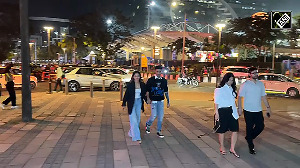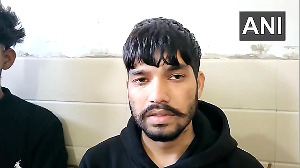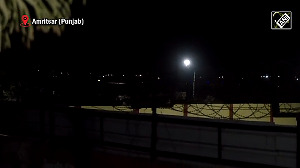Dear Mr Rushdie,
I was born in the same year Midnight's Children was released. While you irrevocably changed the face of the Indian novel -- all the while tweaking its nose -- with spellbinding verbal pyrotechnics and tremendous magic realism, I took my first steps. There is no way to softpedal the kinship I feel with that novel or any of your subsequent and former words, and I have grown up, humbly and inconsequentially, in the ever-expanding shadow of what you have written. Handcuffed to your words, so to speak. This might be a major publication and they might title what I am now writing as a column, but I, sir, am a groupie.
Which makes this unsolicited yet crucial missive far far harder to write. While whooping with immeasurable glee in the news that you will finally be writing a sequel to my favourite book, Haroun And The Sea Of Stories, I must confess that my jaw fell unflatteringly open when I heard of the upcoming Midnight's Children cinematic adaptation. I gasped and huffed and puffed, and it took me a while to collect my thoughts and address you as I am now.
The story of Saleem Sinai is a multilayered work of astonishing brilliance that is, in its original form, impossible to translate to screen. Not that great films haven't come out of unfilmable novels -- Kubrick based a career on doing it bloody well -- and I must say I had a ball at the Barbican a few years ago when I saw the RSC perform their own version of the novel -- written by you alongside Tim Supple -- which was most entertaining. The Doors playing in the background, referencing Apocalypse Now, somehow totally gelled with that delightful stage interpretation, and Zubin Varla was a terrific Saleem.
You, of course, know this. You are preparing to roll up sleeves and muddy your hands with screenplay again, tackling the project afresh -- after already having been through a few gruelling, revolutionary drafts. You've always hoped that Midnight's Children would find its way onto the screen, and felt justifiably heartbroken when India, fickle mother, didn't allow the BBC to shoot its series in the country. You want to do it bigger and better and get that fantastic novel the movie it so completely deserves, and for that endeavour all us fans of the book wish you the very, very best.
Thing is, Whimsy is the single hardest feel to capture adequately on screen. There are filmmakers who excel at high drama and those who make slapstick seem genius, but absurdity isn't everyone's game at all. And Whimsy, in my irrelevant opinion, is what runs through your work the strongest, the raft which helps us float from heavy allegory to incisive satire, the unifying current in your sea of stories. And here I must say, running the risk of being offensive, that the director you have attached to the current project can't quite do Whimsy.
You know better, obviously. And while I don't mean to belittle Deepa Mehta's cinematic achievements -- I personally feel Fire was a raw, more honest film than it is given credit for, and some sequences of Earth were indeed striking -- I somehow do not see her suited to an adaptation of this fantastico-political masterpiece. Midnight's Children is a film that craves as much wit as wisdom, as much madness as metaphor, and despite the fact that Ms Mehta's intimate acquaintance of India may possibly help the project, the very idea fills me with trepidation. And I'm not alone.
The fear is indubitably one of eventual misrepresentation. The film might be an art-house success, win a bagful of awards and, most importantly, reach far more people than the book has touched -- but this wouldn't be worth it if the film can't capture the book's marvellous, untamable spirit. The nightmare is that audiences will get a film distinct from the novel and assume that's what the book is. Like your friend Ian McEwan might have observed when his Atonement was turned into a very well-shot pile of pap, which rocked the boat all the way to the Oscars but severely let the book down. Or Vladimir Nabokov, who was co-credited by Kubrick as screenwriter on Lolita but felt completely helpless as the bushy-eyebrow'd director went wild with the script.
It is a fear encountered by another bearded visionary contemporary to your times, the great Alan Moore. (Just realised that you have more in common; he's the only graphic novelist to be on Time's list of the 100 Great Novels; you're the only Indian novelist on the same) And while Moore continues to play havoc with the medium, he balks at Hollywood and sees his work turned into crowdpleasing blockbuster bile -- and doesn't even get a say in it. It's a creative incubus, and this interview with the man where he 'puts a curse' on the filmmakers, expresses it best.
On the other hand, you have had no such disenchantment with the motion picture format. Bombay has ensured a lifelong love with cinema, with the larger-than-life, and with Bollywood, and you well realise the impact of truly imaginative cinema.
It's just that there are so many people better equipped to handle the form. Guillermo Del Toro of Pan's Labyrinth is the finest director alive when it comes to magic realism, a radical artiste who conjures up chimeras while sticking unbelievably close to the source material, as seen with his loopy, brilliant Hellboy films. Tim Burton is a master at blurring the line between reality and fantasy, while Alejandro Gonzales Inarritu figure-skates through the non-linearity so essential to all Rushdie narratives. Danny Boyle made a top-notch adaptation of Irvine Welsh's Trainspotting, and, with Slumdog Millionaire, has shown he can shoot Bombay incredibly well. And then there's the wonderful Terry Gilliam, but you've already had that conversation.
Of course, there is the argument that an Indian director would do more justice to the source material, being familiar with more of the basic nuances. I personally don't believe that to be necessarily true, particularly for this iconic book that has had such an impact on readers everywhere. If you were inclined to work with an Indian filmmaker though, I'd tip my hat towards Vishal Bhardwaj, who did spectacularly with Omkara, his Othello adaptation, but, more crucially, Makdee, his children's fantasy. Whimsy, again.
You, I reiterate, know better. You're the boss, the shah of blah, and once you drop a word -- or even nod in my general direction -- I'll forsake all objection and inhibition, and do what I can to visit the sets and perhaps, if I'm lucky, even work paisalessly as a stagehand or serf. Anything. And my sincere request to you is to watch Ms Mehta's only attempt at Whimsy, Bollywood/Hollywood, and imagine what could be.
It's just that I, like more than a generation of Indians, feel a kind of propriety towards Saleem and that glorious book. I have grown up with it and dreamt about it and playacted scenes from it and checked out my proboscis-profile in the mirror and...
And I watched Water again last week just to reassure myself and shuddered. John Abraham as Saleem Sinai? Oh. My. God.
All I ask is for an instant more of contemplation,
Much obliged,
Raja Sen
Writer. Fan. Midnight's Grandson.






 © 2025
© 2025